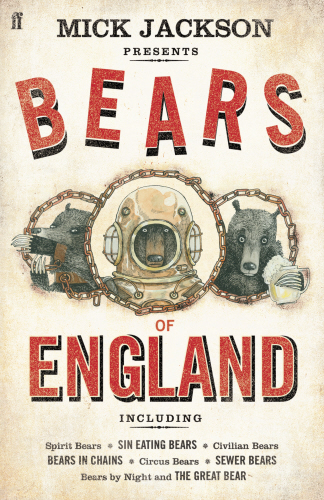You have no items in your cart. Want to get some nice things?
Go shopping I promised in a blog last week to write about Mick Jackson’s collection Bears of England (from which he read at the Small Wonder short story festival) and I’ve been looking forward to it since. It’s a slim book containing eight short stories, each of them describing in a droll but matter-of-fact style the chequered history of the bear population of this country. It’s made up history, as far as I can tell, but the fact that it had me Googling many of its events and characters in the hope they were real should either tell you that Mick Jackson constructs his tales with a campfire storyteller’s easy authority, or that I am a terribly gullible person.
I promised in a blog last week to write about Mick Jackson’s collection Bears of England (from which he read at the Small Wonder short story festival) and I’ve been looking forward to it since. It’s a slim book containing eight short stories, each of them describing in a droll but matter-of-fact style the chequered history of the bear population of this country. It’s made up history, as far as I can tell, but the fact that it had me Googling many of its events and characters in the hope they were real should either tell you that Mick Jackson constructs his tales with a campfire storyteller’s easy authority, or that I am a terribly gullible person.
I actually came across this great book a few months ago, thanks to a Guardian Books Podcast in which Jackson read one of his stories, “Sin-Eating Bears”. If you’re interested, you can still listen to it here. If you do, be sure to also take a look at David Roberts’s accompanying gallery of illustrations. Medals should be dished out to whoever it was at Faber who paired this author and artist. The style of the art meshes perfectly with Jackson’s writing to remind you, as you read, of what it is like to devour picture books as a child.
Yet these aren’t stories for kids. They are, however, stories to consume while wrapped up in blankets or lying tight beneath a duvet. It follows that they make great stories to have read to you. Get this book, tuck a loved one or a friend into bed, then sit beside them in a creaking rocking chair and read to them in your spookiest voice.
At the Small Wonder festival Jackson read “Spirit Bears”, then talked briefly about some of the inspiration behind it, showing the audience some fascinating old photos of bears in the streets of England during the good old days of yore Then, as he read the story, the illustrations from the book were projected onto the wall behind him. They looked even better in their enlarged glory, where the detailed hatching that had gone into each could truly be appreciated. If I have one niggle with the book itself, it’s that the pages aren’t big enough. It’s about the dimensions of an A5 paper, while the art cries out for something four or five times that size.
Still, it ticks all the boxes for me: bears, folklore, and a fantastically dark sense of humour. My favourite was “Bears In Chains”, which is about (among other things) an uprising of bears across London. Sometimes I think the city could use a few more ursine revolutions, and that brings me to the heart of why this book is such a gem. To me, Jackson’s bears represent humanity’s unease with both itself and the natural world it inhabits. They are the things that should be respected and feared but instead are ignored to keep life comfortable. These bears are like the villain creeping up on the lead character of a pantomime as he goofs about, oblivious to the audience screaming, “He’s behind you!” Big, powerful, wise old bears.
If I’ve not managed to sell it to you, you can read some extracts on Mick Jackson’s website. Be warned though, that the book is short and it would be a shame to spoil it for yourself. Instead, with autumn upon you, make some hot soup and sit up past your bed time and read these stories by torchlight. It’ll be worth it, I promise.

About Ali Shaw
Ali Shaw is the author of the novels The Man who Rained and The Girl with Glass Feet, which won the Desmond Elliot Prize and was shortlisted for the Costa First Book Award. He is currently at work on his third novel.




